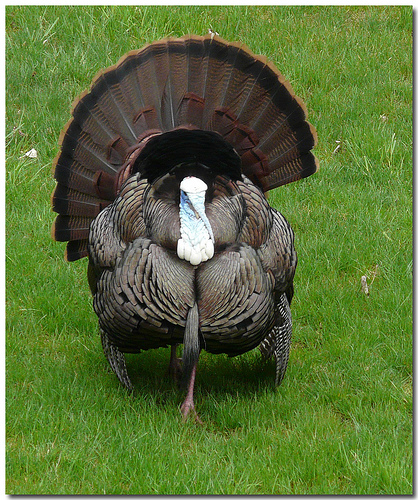 Hi all! I wrote this piece for the Huffington Post and wanted to share it with all of you. Enjoy, and have a happy and healthy day! xo…Sunny
Hi all! I wrote this piece for the Huffington Post and wanted to share it with all of you. Enjoy, and have a happy and healthy day! xo…Sunny
“Oh my God, I am so full!” It’s a refrain that will be heard countless times around the country today as we sit around tables with friends and family. Sure, Thanksgiving is about being grateful, and it’s about the harvest, and the history of our nation. But really, it’s about the food. (Even Google’s doodles are just pictures of victuals with links to Ina Garten recipes this year!) In American culture—as in so many others—it’s natural and normal to celebrate with edibles. Food is homey, comforting, delicious, and fun. Unless you’re one of the estimated 10 million Americans fighting an eating disorder, that is. Then food, and this whole holiday, can be scary, disturbing, and painful.
“We start prepping people [we treat for eating disorders] for Thanksgiving about a month ahead of time,” says Cynthia M. Bulik, Ph.D., director of the University of North Carolina Eating Disorders Program and author of Crave: Why You Binge Eat and How to Stop. “Being around so much food is like someone with acrophobia leaning off the Empire State Building. It is being surrounded by your biggest fear for an entire day. For someone with anorexia it’s the fear of being expected to eat and enjoy it. For someone with bulimia orbinge eating disorder it is being able to control urges to binge or purge when you’re completely surrounded by trigggers.”
When I was in the throes of binge eating disorder in my late teens and early twenties, Turkey Day was always time of incredible mixed emotion. Along with the excitement and fun of seeing family and eating some truly great food (Mmm, mom’s Dutch apple pie), came intense body image trouble and a fixation on trying to be “good” this year. “Comments about who is eating what, who has seconds, who is a good eater and who is picky, who likes what and who doesn’t like certain things—just the constant focus can be absolutely overwhelming and anxiety provoking,” says Bulik.
Psychologist Michael D. Lukens, Ph.D., takes it even further: “The food and the feasting are literally the focus for the holiday gathering itself, and to make matters worse, overindulgence is not only allowed it’s really actually encouraged,” says Lukens, who has worked one-on-one with addicts and binge eaters in South Florida for more than 20 years. “If everyone says overdoing it an OK thing, who are you to show restraint and risk raining on everyone else’s parade? The conscience can get pretty slippery around the holidays, and Thanksgiving kicks off the season, so it’s kind of a make it or break it point for many of us. If we ‘fall’ on Thanksgiving the whole holiday season can so easily turn into a whole month of acting out.” That’s how it used to be for Chevese Turner, founder and CEO of the Binge Eating Disorder Association: “During my darkest days as a binge eater I recall eating my way through the holidays, which triggered negative emotions and plenty of depression,” she says. “I dealt with it by cycling through bouts of bingeing and then dieting, which only made me feel more hopeless.”
Of course, the issues this holiday brings up aren’t just about the stuffing and pumpkin pie. Eating disorders aren’t necessarily about food at all: They are mental disorders that research shows are firmly rooted in genetics and biology—scientists have even pinpointed certain genes that they think may contribute to anorexia and bingeing behaviors. Personality quirks like perfectionism and low self-esteem, childhood trauma, and family dynamics are key in the development of these disorders, too.
Speaking of family: “If dysfunctional family issues are part of what stirred up the disordered eating, [at Thanksgiving] you’re getting together—or intentionally not getting together—with those same ‘well intentioned but toxic’ relatives,” says Lukens. “This means you’ll have that much more emotional turmoil driving the cravings [to restrict or overeat]. Your mother’s subtle criticisms, your brother’s contempt, your father’s drinking problem—they are all once more right in your face; or, even if you’re not physically getting together with family the painful memories have a tendency to float into your mind at this time of year.”
So, what can someone dealing with an eating disorder do to feel less scared and more present this holiday?
• Get Support. “If you have someone who understands you in your family or friendship circle, talk with them ahead of time and get their support throughout the day,” says Bulik. “Use them as a ‘safe person’ if you need to take some time out, catch some fresh air, or process something that happened that bothered you.” Free eating disorder support groups like Eating Disorders Anonymous, Overeaters Anonymous,and Anorexics and Bulimics Anonymous usually have increased numbers of meetings and events during this time of year and welcome newcomers. Online support sites like my site, HealthyGirl.org, andSomething Fishy can be very helpful, too.
• Plan in Advance. “Don’t skip breakfast to ‘make it easier’ to get through Thanksgiving dinner,” says Bulik. “As much as possible stick to your regular eating plan. Skipping breakfast or lunch will make it much harder to get through dinner—regardless of which eating disorder you have. Also allow your plan to dictate what you eat not other people’s comments.” Lukens agrees: “I highly recommend you go armed with a game plan, don’t just wing it,” he says. “For instance, you might decide to avoid the pre-meal snacks and during dinner make deliberate choices in terms of portion size, second helpings, etc.”
• Try Not to Listen to Other People’s Diet/“Fat” Talk. “At our last mindful meal group, one participant said there was a lot of diet-talk around the Thanksgiving table in her house because most were overeating and trying to compensate by talking about weight, dieting, and remorse,” says Amy Jaffe, R.D., a nutritional therapist at Miami Counseling Center in Florida. “People’s weights and bodies were discussed in a cavalier manner. In years past, she had succumbed to the cycle of restricting in front of people at the meal then bingeing in private after everyone left.” It’s important to set boundaries and remind yourself that other people’s issues with food and with their bodies are not your own.
• Forget the “All or Nothing” Mindset. “Depriving yourself of special holiday foods or feeling guilty over a particular food choice is not helpful,” says Jaffe. “Deprivation and guilt sabotage the holiday spirit.”
• Remember the Reason for the Season. “Even though it seems on the surface that Thanksgiving is all about food, try to remember what it is really all about,” says Bulik. “If there is something or someone in your life that you are thankful for, focus on that rather than the turkey and the trimmings.”
Finally, a bit of advice from someone who’s been there: “Honor your journey by eating the foods you want, listening to your body’s cues, avoid engaging in ‘fat talk,’ and keeping your support systems close-at-hand,” says Turner. “The food you eat and your size should not define you, your worth, or your ability to enjoy the holidays.” Now, go and have a happy, healthy Thanksgiving!
Do you have any strategies for staying sane about food at Thanksgiving? Please share!



As sad is it is, I am not going home for thanksgiving this year is my strategy. My hubby is overseas and I decided not to drive or fly to be with my family. This is not the only reason (I go to school and hard to afford that much time off from my studies due to the travel time) but it is what it is. Being around massive amounts of food causes me major anxiety with my disorder. When I was planning to go home for the holiday I was already freakin’ out two months prior! I really hope someday that big gatherings like that and with food don’t bring up those feelings. I hate that here in America is almost acceptable to eat massive quantities of food and no one really says much. Like the post had mentioned, Thanksgiving Day it is encouraged for people to eat 4,000 plus calorie meals.
[…] - dealing with a holiday feast without harming yourself in the process isn’t easy. Healthygirl.org has a nice list of tips that may help: • Get Support. “If you have someone who understands you […]
Great post - I especially like getting rid of the all or nothing mindset. Whenever I feel deprived, it is a set up for a binge.
The other thing that I found helpful during the holidays is trying to be of service. Instead of focusing on food I try to focus on how I can be helpful. Could I help set the table, do the dishes or help out in some other way?
[…] Healthy Girl, Why Thanksgiving is So Hard For People With Eating Issues […]